 Illustrated by Anna Sudit.
Illustrated by Anna Sudit.In the mid-aughts, when I was trying to decide what college to attend, I asked my guidance counselor about Hampshire. "You don't want to go there," she said of the small liberal-arts school in western Massachusetts. "It's mostly just hairy lesbians." (Note to people who work with young, aspiring writers: Be careful what you say.)
Of course, she had no way of knowing that, less than one year later, I'd be growing out my own body hair and sleeping with my roommate — though not at Hampshire. I spent the next four years with fuzzy calves and hairy armpits, and it was honestly pretty great. My body hair grew in soft and golden and was an easy way to make my queerness visible to other lesbians. Sure, it's a stereotype, but it was also part of the secret visual code of the activist/hipster-y community I was in. There were plenty of queer girls among us who didn't rely on visual signifiers to indicate their identities, but I wasn't yet one of them: It was really important to me to be seen for who I was, and my long body hair, juxtaposed with the short hair on my head, was my ticket.
AdvertisementADVERTISEMENT
While the reaction to my hair situation from my friends and girls I dated was generally positive, the rest of the world wasn't so stoked. I got a lot of stares, especially on the subway. I'd sit across from some dude and watch his eyes dart from my calves to my face. If I was with friends, we could laugh it off. If I was alone, it was threatening. Men on the street would often tell me that I looked like a boy. Obviously, equating body hair with boyishness is only an insult if you think it’s bad to be masculine while female, but it still managed to make my face burn red.
Though this wasn't that long ago in the grand scheme of things, it was before marriage equality in New York, "It Gets Better" campaigns, and other mass-appeal movements that brought contemporary queer issues to the forefront of the cultural consciousness. My visibility got me in the door with my own community, but it was frequently met with hostility from the outside world.
And, even if it wasn't interpreted as queerness, it was read as a rejection of femininity — which it actually wasn't. I'm super-feminine and like to embrace that part of myself, but I think that almost made it worse. It felt like people could understand masculine queer women with fuzzy legs, but my furry gams sticking out of a floral-print dress seemed simply unacceptable.
 Illustrated by Anna Sudit.
Illustrated by Anna Sudit.Slowly but surely, though, that stigma is being shed. It's thrilling that this issue is finally making its way into the larger feminist conversation happening online, with roundups of armpit-hair photos and compelling personal essays about why women are ditching their razors. Everyone seems to be arguing the same thing: That it’s no big deal. Much like the current popular backlash against Brazilian waxes, body hair is being reclaimed. Grown-ass womanhood in all its natural glory, rather than childlike hairlessness, is in style. It’s trendy.
AdvertisementADVERTISEMENT
For me, though, the trend is a few years too late. Eventually, it became hard to reconcile the external need to look conventionally appropriate/professional with the internal need to display radical femininity. In other words: My hairy legs didn’t really fly at the jobs I got after college. I just didn’t want to call attention to myself in that way in an office setting — it’s one thing to get stares from strangers and another thing entirely to get looks from coworkers and clients.
That’s the thing this whole au naturel movement is neglecting: the reality of what it’s like to present so unconventionally in the real world. It’s hard. I’m lucky that this particular grooming habit isn’t tied with my vision of myself, so I can take it or leave it depending on the situation. At the moment, I’m shaving again, just because, for me, it’s like wearing makeup — part of feeling ready for the day. For many women, though, shaving compromises who they are. In that way, the call for an NBD attitude toward body hair erases the identities of people for whom body hair is a big deal.
There’s a difference between natural beauty and radical beauty, though body hair can be both. They’re both important. But, no matter how far we come with embracing the natural, I hope there will always be room for the radical. After all, what would suburban guidance counselors warn teenagers about if there were no more boundaries to push?
Like this post? There's more. Get tons of beauty tips, tutorials, and news on the Refinery29 Beauty Facebook page!